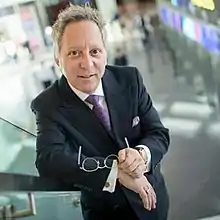Charles Glasser
Charles J. Glasser Jr. is an American attorney, writer, educator and journalist with a background in financial and investigative reporting, libel, privacy and freedom of information issues.
Charles Glasser | |
|---|---|
 | |
| Born | Charles J. Glasser Jr. |
| Education | Hunter College (BA) New York University School of Law (JD) |
| Occupation | attorney, writer, educator, journalist |
| Website | charlesglasser |
He was Global Media Counsel for Bloomberg News for more than a dozen years,[1] and then developed his own media law practice and consultancy.[2] He is also an adjunct professor of Media Law and Ethics at The New York University Arthur Carter Journalism Institute and at the Craig Newmark Graduate School of Journalism at the City University of New York (CUNY).[3][4]
Education
Glasser earned dual degrees in political science and philosophy from Hunter College (CUNY) in 1993, where he graduated as valedictorian in 1993 and captained Hunter's men's fencing team to a national championship.[5][6] He subsequently graduated from the New York University School of Law in 1996, where he was awarded the Arthur T. Vanderbilt Medal for service to the legal community.[7]
Career
Journalism
Glasser now writes occasionally for a wide range of publications.
Law
Glasser began his legal career while in law school as a clerk for the Law Department of NBC News. After graduation, Glasser practiced law in Portland, Maine at Preti, Flaherty, where he represented Gannett Communications defending The Portland Press-Herald and other local newspapers in defamation and court access matters. His significant cases included Levinsky’s v. Wal-Mart Stores [8] where the Court of Appeals for the First Circuit held that a statement capable of many different meanings could not be defamatory on its face; Doe v. Department of Health,[9] where the state’s highest court held that the public had a right to access the disciplinary records of state mental facility employees who allowed a minor to be raped and murdered while in their care; and Rudolph v. City of Portland, where Glasser, acting as pro bono counsel, succeeded in forcing the city to stop arresting peaceful panhandlers on First and Fourteenth Amendment grounds.[10]
In 2000, Glasser joined Willkie Farr & Gallagher as a senior associate dedicated to litigation of media law issues on behalf of their client Bloomberg News. He joined Bloomberg in 2002 as Global Media Counsel, responsible for pre-publication review, libel and privacy litigation, and landmark freedom of information cases. Glasser succeeded in winning the landmark Freedom of Information case Bloomberg v. Board of Governors of the Federal Reserve, where the federal courts held that the public had a right to know about a secret multi-billion dollar bank lending scheme that augured the 2018 economic crisis.[11][12] Bloomberg News editor-in-chief Matthew Winkler described Glasser in 2012 as "the model of probity as our newsroom counselor" and "indispensable as the legal authority in The Bloomberg Way."[13]
In 2013, Glasser left Bloomberg to establish his own practice, concentrating on academic and advocacy work in the free speech area. In 2016, he was appointed adjunct professor at the New York University Arthur Carter Journalism Institute,[14] where he currently teaches graduate-level media law and ethics and media critique. He is also a Global Expert for Columbia University's Global Freedom Expression initiative.
Philanthropic work and professional associations
Glasser is also a member of the Media Law Resource Center, a nonprofit organization dedicated to providing legal resources in defense of publishers, bloggers and broadcasters.[15] He is also involved with the Committee to Protect Journalists, and Article 19,[16] He has provided pro bono advice and litigation support for freelance journalists.[17]
References
- "Attorney Glasser leaving Bloomberg". Talking Biz News. May 6, 2013.
- "Charles Glasser, Esq. / Media Law & Ethics". charlesglasser.net.
- "Charles Glasser: Adjunct Faculty". NYU Journalism.
- "Adjunct Faculty". CUNY. Retrieved 27 January 2019.
- "Get The Story: Journalism, Media and The Big City". The City University of New York. March 2005. Archived from the original on 2018-01-21. Retrieved 2018-01-20.
- "Hunter College 167th Commencement Exercises" (PDF). Hunter College. June 2, 1993.
- "International Libel and Privacy Handbook". LexisNexis.
- "Levinsky's v. Wal-Mart Stores, Inc., 127 F. 3d 122 - Court of Appeals, 1st Circuit 1997". Google Scholar. Retrieved 2020-06-17.
- "Doe v. Department of Health & Human Services". Justia Law. Retrieved 2020-06-17.
- "International Libel and Privacy Handbook". store.lexisnexis.com. Retrieved 2020-06-17.
- "Bloomberg, Lp v. BOARD OF GOVERNORS OF FED. RES., 601 F. 3d 143 - Court of Appeals, 2nd Circuit 2010". Google Scholar. 2010-03-19. Retrieved 2020-07-07.
- "Bloomberg Wins Its Lawsuit Against the Federal Reserve". Columbia Journalism Review. Retrieved 2020-06-17.
- Winkler, Matthew (2011-09-28). The Bloomberg Way: A Guide for Reporters and Editors. John Wiley & Sons. ISBN 978-1-118-14988-1.
- "Former Bloomberg media attorney to teach at NYU". Talking Biz News. June 25, 2015.
- "Members - Defense Counsel Section". Media Law Resource Center. Archived from the original on 2018-01-21. Retrieved 2018-01-20.
- "Charles Glasser: Media Consultant". Columbia Global Freedom of Expression.
- "Indemnity clauses leave freelancers open to lawsuits". Poynter. May 1, 2015.